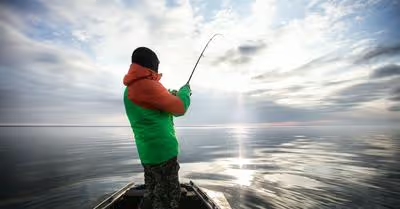
Key Takeaways
- A fishing license is usually required for everyone on a boat.
- Anyone who plans to assist with fishing needs their own license.
- Fishing licenses can be good for a single day up to a whole year or longer.
- Night fishing is legal in most places.
- You keep the fish you catch on charter boats.
Fishing license regulations vary from state to state. It's vital to know the requirements to make sure you and your guests are on the right side of the law.
In general, a fishing license is required for each individual on the boat who plans to take any fish out of the body of water. There are a few exceptions depending on the state, such as state parks and charter boats. The cost will vary by location and whether the fishing license is daily or annual.
We've spent years relaxing on boats with our lines cast. Let us share our experience and well-researched information, so your fishing trips go off without a hitch!
Fishing Licenses, Information, Fees, and More
Even with the information provided here, it's always a good idea to check with the local wildlife agency or DNR to determine the specific requirements in your area.
By abiding by the law and conserving our aquatic resources, we can ensure that future generations can enjoy them for years to come.
Sport fish restoration is a group effort!
Licensure laws and regulations are changing year to year; don't get caught unawares!
Does Everyone Need a Fishing License on the Boat Even If They're Not Fishing?
No, absolutely not. In all states in the U.S., only those who plan to fish need the proper license.
But if a person on the boat is actively helping to bring in the catch, they may also be required to have one. This little detail trips up a lot of new anglers.
For example, if they're baiting hooks or removing catches from lines, then they also need a valid fishing license. Helping out counts as fishing, as far as fishing licenses are concerned.
If one of the people on the boat thinks they might end up wanting to partake, it's best to go ahead and get the license before getting on the boat.
It's always frustrating to have an extra person on board who can't have fun because they don't have a license—so make sure everyone is prepared before you depart!
Fishing licenses aren't expensive, usually around $20, but some are as low as $10.
The proceeds go to supporting the existing natural ecosystems.
Don’t forget that the boat owner can be on the hook for their passengers' mistakes.
Does Everyone on the Boat Need a Fishing License in California?
Yes, everyone on the boat over the age of 16 requires a fishing license in the state of California.
You can find the most up-to-date information on the CA Department of Fish and Wildlife's sport fishing website.
Being a coastal state, California licenses have differences depending on if you plan to fish with a freshwater license or need a saltwater fishing license.
Who Is Exempt From Fishing Licenses In California?
Exceptions include:
- People who are under the age of 16.
- Native American tribal members fishing in traditional or usual and accustomed areas.
- Licensed charter boat customers and their crew, as long as the charter company has obtained a Vessel Master License from the California Department of Fish & Wildlife.
Do I Need a License to Fish From Shore In Florida?
Yes, you do need a fishing license in Florida to fish offshore, with the exception of State Parks.
If you plan on fishing in Floridian waters, it doesn't matter if you're on a pier, the shore, or a boat, or in freshwater or with a saltwater fishing license; you need a fishing license to fish in the state of Florida.
Their options for fishing and hunting permits can be found on their official state department website.
Is Night Fishing Illegal?
Night fishing is not illegal. Most states do not have restrictions on what times of day you are allowed to catch fish.
Certain species, like salmon, have specific hours when they are allowed to be caught in certain locations, but those policies are to limit the amount taken, not limit night fishing.
Consult a local bait and tackle shop or the DNR website to confirm that no specific types of gear or techniques are forbidden.
Do I Need a Fishing License for Catch and Release?
Fishing licenses are required even if you plan on returning your catch to the water. These licenses give you permission to cast your line and try to catch any wildlife resources with fishing rods.
Whether or not you keep it doesn't matter if you're engaged in simple sport fishing.
Many people find this ridiculous, but consider that even if you're not taking them from the water, your presence in the environment has an impact on the wildlife, and it's almost certain you'll injure a fish or two over the course of your time out.
As we said before, fishing and hunting licenses are about supporting the proper care and preservation of our land and wildlife. You're not "buying" your catches.
How Long Is My License Good?
This changes from state to state and even county to county.
For the most part, fishing licenses are valid from the date of purchase until the expiration date printed on them.
The length of time a license is good for can range anywhere from 1 day to 1 year, depending on where you're fishing and your planned excursion.
Usually, licenses must be renewed annually, but some states allow longer periods before renewal is required.
You can usually find this information in your local office or online at the DNR website.
This interactive map of the United States is the prime resource for all information regarding fishing licenses, state by state!
Some regions offer a lifetime license that can be a saltwater license or for freshwater fishing.
The license requirements and license fees for this kind of license will be bigger than short-term ones purchased online.
Do You Keep the Fish On a Charter Boat?
Usually, yes. You are allowed and encouraged to keep the fish you catch on a charter boat.
Many charter boats offer a convenient cleaning station on board so that you can clean your catch before returning home. Some will even package it up nicely.
Charter boats are a great way to get out on the water and catch some fish without too much hassle.
They're the perfect setup for newbies and experienced anglers looking for a low-pressure experience.
How To Help Conserve Fish Habitats as a Sport Fisherman
As a recreational fisherman, you can play an important role in helping to conserve fish habitats and maintain healthy populations of aquatic species. Here are some ways you can get involved:
- Catch-and-release: Whenever you catch a fish that you don't intend to keep, release it back into the water as quickly as possible. This minimizes stress on the fish and increases its chances of survival.
- Use fish-safe gear: Avoid using fishing gear that could harm fish or damage their habitats. For example, use circle hooks instead of J-hooks, which are less likely to get caught in the fish's gut.
- Mind the ecosystem: Be careful not to disturb the natural habitat when you're fishing. Avoid trampling on vegetation, plowing through aquatic vegetation, or leaving floating litter behind.
- Support conservation efforts: Get involved with organizations that work to conserve fish habitats and improve fishing conditions.
- Follow fishing regulations: Familiarize yourself with the fishing regulations in your area, and follow them strictly. These regulations help ensure that populations are not overfished and that their habitats are protected.


